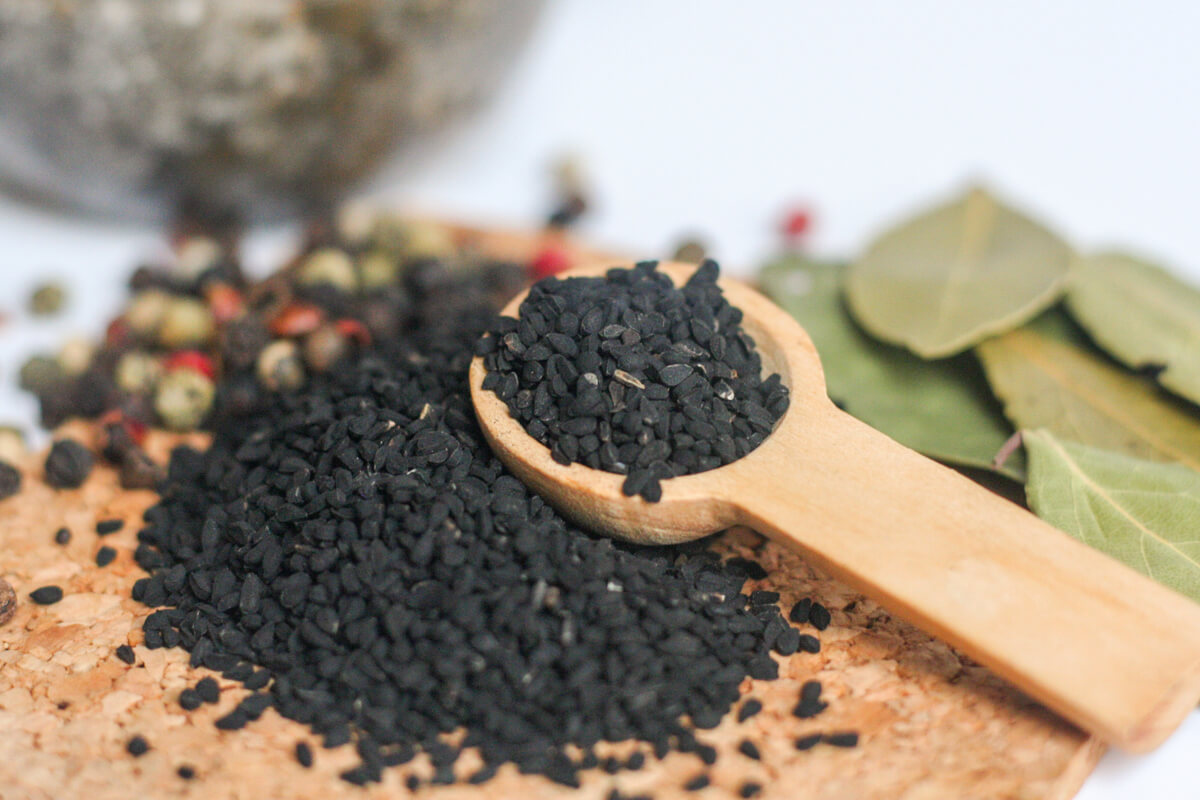Background
Oxidative stress and its subsequent inflammation correlate with a myriad of chronic diseases including cardiovascular illness and diabetes. The severity of inflammation and oxidative damage can be measured in part by biomarkers including serum malondialdehyde (MDA), tumor necrosis factor alpha (TNF-α), and high-sensitivity C-reactive protein (hs-CRP). (2)(4) With the interest in natural remedies rising, research on botanical medicine continues to be conducted due mainly to the potential of medicinal herbs to offer pharmacological effects, often with less adverse effects than their pharmaceutical counterparts. Nigella sativa (N. sativa) is one such herb that has gained attention due to its active constituent, thymoquinone (TQ), which has demonstrated antihistaminic, antihypertensive, hypoglycemic, antioxidative, antineoplastic, and immune-stimulating effects. (5) This article sought to review the efficacy of N. sativa in seed and seed oil forms on human serum biomarkers of inflammation and oxidative damage.
N. sativa, commonly known as black cumin, black seed, and black caraway, possesses many medicinal properties.
Methods
The systematic literature review and meta-analysis consisted of the medical databases of PubMed-MEDLINE, SCOPUS, and Web of Science. The search was completed via MeSH terms focused on N. sativa and its synonyms, as well as its biomarkers such as total antioxidant capacity (TAC), superoxide dismutase (SOD), TNF-α, MDA, and hs-CRP. Articles published prior to August 2019 and those that were written in languages other than English were omitted from the review. Only randomized controlled trials (RCTs) with a parallel or crossover design, with participants aged 18 or older, and with data including standard deviation measurements of the mean and 95% confidence intervals on biomarkers were included in the review. Two independent investigators completed the data extraction, with a third investigator examining the process. In studies with multiple reported time periods, only the longest duration of treatment was included. Sensitivity analysis was performed for evaluation of each study on overall effects size, heterogeneity was assessed with a fixed-effect model, and publication bias was estimated via funnel plots and regression analyses. The search resulted in ten viable studies to be included in the review, of which nine were double-blinded and one utilized a cross-over method. The duration of each study varied from six to 48 weeks, dosage of the N. sativa seed and seed oil varied from 1 to 3 g per day, and 630 individuals participated with diagnoses including diabetes mellitus type 2, obesity, metabolic syndrome, nonalcoholic fatty liver disease, rheumatoid arthritis, and ulcerative arthritis.Results
Six of the RCTs reported significant changes in hs-CRP, five in TNF-α, four in MDA, four in SOD, and four in TAC. The weighted mean differences of these values, respectively, were -0.67 mg/L, -2.29 pg/mL, -1.18 nM/L, 66.30 Unit/mL, and 0.35 mM. Doses at or below 2 g decreased hs-CRP more effectively than doses greater than 2 g. Moreover, trial durations greater than eight weeks with the N. sativa in seed oil form more effectively decreased TNF-α than those lasting less than or equal to eight weeks with N. sativa in seed powder form. One study demonstrated a direct relationship between N. sativa dosage and inflammatory markers. No evidence of publication bias was identified for hs-CRP, MDA, SOD, or TNF-α; however, Egger’s regression test indicated publication bias for TAC.Critical analysis
Studies have demonstrated the anti-inflammatory and antioxidative effects of N. sativa; however, this is one of the first systematic reviews and meta-analyses to report on the plant’s effect on human serum biomarkers of inflammation and oxidative stress. N. sativa in its seed oil form proved to be more effective than in powder form, likely due to the higher TQ content in volatile N. sativa oil. Reported anti-inflammatory mechanisms by which N. sativa acts on the human body include inhibition of lipoxygenase and cyclooxygenase pathways in arachidonate metabolism as well as decreased nitric oxide production via inhibition of inducible nitric oxide synthase (iNOS), a decrease in iNOS mRNA, a decrease in iNOS protein expression, and a decrease in lipopolysaccharide-activated macrophages. (1)(3) Several studies in the review provided somewhat conflicting data. While N. sativa at doses of 1 and 2 g per day was shown in one RCT to ameliorate serum inflammatory cytokines in a 3-month duration trial in adults with asthma, another 3-month duration trial dosed at 3 g per day showed no significant decrease in hs-CRP in adults with central obesity. Contributing factors to the varying results include the higher efficacy of a lower dosage of this herb and the different baseline of inflammatory markers, which may pose as a confounding factor. While the study possessed many strengths including limiting the inclusion criteria to well-designed studies (i.e., excluded non-RCTs), decreasing bias via the presence of multiple independent investigators, and performing publication bias and heterogeneity and sensitivity analyses, there were limitations. Not only were there few studies included, but because few of those studies included the measurement of other major biomarkers of oxidative damage such as interleukin 6, nuclear factor kappa B, glutathione peroxidase, and catalase, these biomarkers were omitted from the analysis. The study was also limited by its short duration, as the majority of the studies lasted less than or equal to eight weeks. Additionally, the study was confounded with several factors, one of which being the multitude of diseases with varying pathologies included.The bottom line
Data in this meta-analysis indicate that the consumption of N. sativa seed and seed oil can reduce oxidative and inflammatory biomarkers of hs-CRP, TNF-α, and MDA, and increase TAC and SOD levels. Publication bias was noted in the analysis of TAC. Higher efficacy was demonstrated with lower N. sativa dosage, longer duration, and the use of the seed oil as opposed to the seed itself, likely due to higher TQ content. More research, including larger clinical trials with more controlled parameters are needed to further elucidate and prove these claims.- El-Mahmoudy, A., Matsuyama, H., Borgan, M. A., Shimizu, Y., El-Sayed, M. G., Minamoto, N., & Takewaki, T. (2002). Thymoquinone suppresses expression of inducible nitric oxide synthase in rat macrophages. International immunopharmacology, 2(11), 1603–1611. https://doi.org/10.1016/s1567-5769(02)00139-x
- Kheirouri, S., Hadi, V., & Alizadeh, M. (2016). Immunomodulatory Effect of Nigella sativa Oil on T Lymphocytes in Patients with Rheumatoid Arthritis. Immunological investigations, 45(4), 271–283. https://doi.org/10.3109/08820139.2016.1153649
- Mahboubi, M., Mohammad Taghizadeh Kashani, L., & Mahboubi, M. (2018). Nigella sativa fixed oil as alternative treatment in management of pain in arthritis rheumatoid. Phytomedicine : international journal of phytotherapy and phytopharmacology, 46, 69–77. https://doi.org/10.1016/j.phymed.2018.04.018
- Mahdavi, R., Namazi, N., Alizadeh, M., & Farajnia, S. (2016). Nigella sativa oil with a calorie-restricted diet can improve biomarkers of systemic inflammation in obese women: A randomized double-blind, placebo-controlled clinical trial. Journal of clinical lipidology, 10(5), 1203–1211. https://doi.org/10.1016/j.jacl.2015.11.019
- Majdalawieh, A. F., & Fayyad, M. W. (2015). Immunomodulatory and anti-inflammatory action of Nigella sativa and thymoquinone: A comprehensive review. International immunopharmacology, 28(1), 295–304. https://doi.org/10.1016/j.intimp.2015.06.023
- Montazeri, R. S., Fatahi, S., Sohouli, M. H., Abu‐Zaid, A., Santos, H. O., Găman, M. A., & Shidfar, F. (2021). The effect of Nigella sativa on biomarkers of inflammation and oxidative stress: A systematic review and meta‐analysis of Randomized Controlled Trials. Journal of Food Biochemistry, 45(4). https://doi.org/10.1111/jfbc.13625


